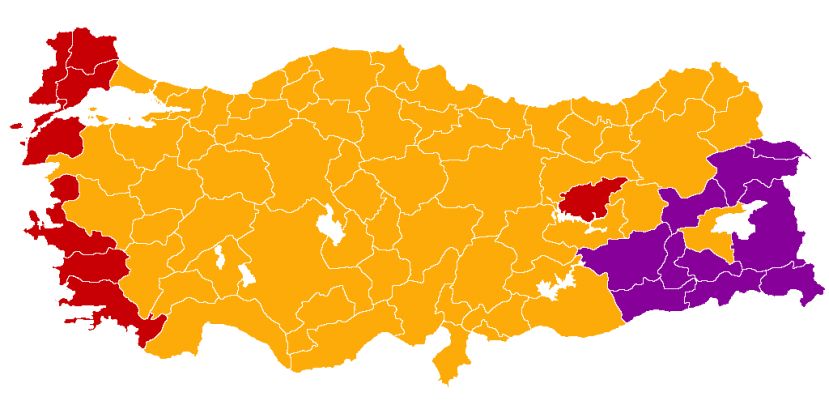What Do Turkey's 2018 Election Results Mean for US?
- Written by Admin TOA
- Published in TOA Authors
By Ali Cinar - The June 24 presidential and parliamentary elections marked the beginning of a new era in Turkey’s administrative system, moving to an executive presidential one, at a time when President Recep Tayyip Erdoğan and the current government are under criticism from the outside world for taking steps back from democratic gains. If I had to sum up the Turkish election in one word it would be “democracy.” The voter turnout rate was 87 percent and five different political parties passed the 10 percent threshold needed to enter parliament.
Turkish voters reasserted their commitment to democracy in Sunday’s elections. Despite the negative campaign against Turkey, the Turkish elections were transparent and fair, as many leaders around the world have concluded. Eight international organizations with 415 elections observers were present on Election Day, it is also important to note that President Erdogan’s opposition challenger Muharrem Ince accepted the results of the election at the election night. This is instrumental in understanding the fairness and the oversight of the elections, given how heated the campaign has been, it’s a strong message of fairness and transparency that Muharrem Ince accepted the results.
President Erdoğan has thus been elected as the first president of the new system and from now on how the presidential system will function in Turkey is extremely critical. In his victory speech, President Erdoğan stated that he wanted to leave the rifts behind and promised a better democracy for the people. He also pledged to lift the state emergency during his campaign, it is very important for Turkey to have a healthy democracy in the region.
As we have seen play out, there are disagreements over several critical issues which continue to strain and undermine the relations between the U.S. and Turkey. While it is natural to have differences among allies on such critical issues, both sides should refrain from escalating the tension to an unusual level.
Turkey is currently involved in battles on various sides, within the country and outside: PKK, YPG, FETO, ISIS (Daesh), and DHKP. These are big threats to Turkish national security, and the world, especially NATO allies must understand the threats Turkey is faced with.
From the Turkish side, there are several areas of concern: U.S. support for YPG, no progress on the Gulen extradition, the planned blockage of the F35 fighter jets delivery. These are critical to understanding the strained relations, now from the U.S. side: the jailing of Pastor Brunson, the question on Turkey's status in NATO, the alleged violation of human rights, and the state of emergency in Turkey. These are key concerns for the US, and one must understand them to fully understand the current state of relations.
I am glad that with Secretary of State Michael Pompeo’s leadership and coordination with Turkish Foreign Minister Mevlut Cavusoglu, we are beginning to see real collaboration, beginning with the Manbij Roadmap, making way for the removal of YPG elements in the area. This was a great gesture and move from U.S. side to agree on the Manbij Roadmap and it has opened up new doors for stronger collaboration to come. Also, the joint working group between the U.S. and Turkey has been meeting and will be meeting again in mid-July to further discuss and resolve the issues between the two strong NATO allies.
We have to pay attention to another vital factor in the relations between the two countries, the lack of trust and confidence are currently seen which has been affecting the relationship negatively. The biggest question is who benefits from worsening relations between the U.S. and Turkey? For what reason would anyone want to see either country leave this important relationship behind?
President Trump and President Erdogan will meet in Brussel during the NATO Summit in mid-July, the U.S. Ambassador to Ankara should be appointed as soon as possible in order to have a strong communication channel. This is one of the first steps to ensuring direct communication between the two nations, we from the U.S. must have a representative in Turkey.
It is more important now than ever that Washington and Ankara maintain their strategic and historic relationship in order to ensure the security of both of their countries.
Regardless of the election results on Sunday, it is a vital time to reset relations with Turkey and its leaders. The U.S. simply cannot push Turkey towards Russia and Iran in search of new partners.
In the U.S., Turkey has a strong partner and so does the U.S. in Turkey.
We have to work together to ensure a strong and stable Turkey, this is the Turkey that will be a beneficial partner for the U.S.
Latest from Admin TOA
- 300 migrants to be housed at shuttered Catholic church on Northwest Side in Chicago
- Turkish Stand-Up Sensation Hasan Can Kaya Embarks on U.S. Tour with Art Evi Production, in212 Production, and TAAS New York
- "Lean Startup, To Lean Company, To Rich Exit" by Dr. Kenan Sahin is released with Forbes Books
- LOSEV USA Ramadan Campaign Let the Children Heal First with Your Ramadan Donations
- Azerbaijan Society of America Honors Centennial Anniversary of the Great Azerbaijani Politician the National Leader of Azerbaijan President Heydar Aliyev

